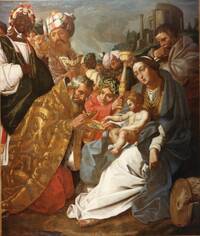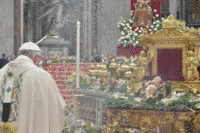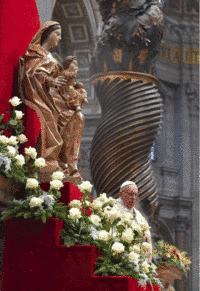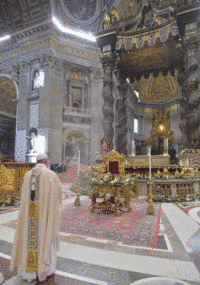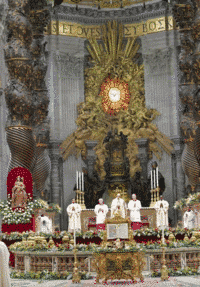Solemnity of the Epiphany of the Lord 2018
Pope Francis's homily at Holy Mass
St Peter's Basilica, Saturday 6 January 2018 - also in Arabic, French, German, Italian, Polish, Portuguese & Spanish
“Three actions of the Magi guide our journey towards the Lord, who today is revealed as light and salvation for all peoples. The Magi see the star, they walk and they offer gifts.
To see the star. This is where it starts. But why, we might ask, did the Magi alone see the star? Perhaps because few people raised their eyes to heaven. We often make do with looking at the ground: it’s enough to have our health, a little money and a bit of entertainment. I wonder if we still know how to look up at the sky. Do we know how to dream, to long for God, to expect the newness he brings, or do we let ourselves be swept along by life, like dry branches before the wind? The Magi were not content with just getting by, with keeping afloat. They intuited that, so as to truly live, one needs a lofty goal and thus one needs to keep one's eyes up.
Yet we can also ask why, among all those who looked up at the heavens, so many others did not follow that star, “his star” (Mt 2:2). Perhaps because the star was not eye-catching, did not shine any brighter than other stars. It was a star – so the Gospel tells us – that the Magi saw “at its rising” (vv. 2, 9). Jesus’ star does not dazzle or overwhelm, but gently invites. We may ask ourselves what star we have chosen to follow in our lives. Some stars may be bright, but they do not point the way. So it is with success, money, career, honours and pleasures when these become our life. They are meteors: they blaze momentarily, but then quickly burn out and their brilliance fades. They are shooting stars that mislead rather than lead. The Lord’s star, however, may not always overwhelm by its brightness, but it is always there, ever kindly: it takes you by the hand in life and accompanies you. It does not promise material reward, but ensures peace and grants, as it did to the Magi, “exceedingly great joy” (Mt 2:10). But it also tells us to walk.
To walk, the second thing the Magi do, is essential if we are to find Jesus. His star demands a decision to take up the journey and to advance tirelessly on our way. It demands that we free ourselves from useless burdens and unnecessary extras that only prove a hindrance, and accept unforeseen obstacles along the map of life. Jesus allows himself to be found by those who seek him, but to find him we need to get up and go, not sit around but take risks, not stand still, but set out. Jesus makes demands: he tells those who seek him to leave behind the armchair of worldly comforts and the reassuring warmth of hearth and home. Following Jesus is not a polite etiquette to be observed, but a journey to be undertaken. God, who set his people free in the exodus and called new peoples to follow his star, grants freedom and joy always and only in the course of a journey. In other words, if we want to find Jesus, we have to overcome our fear of taking risks, our self-satisfaction and our indolent refusal to ask anything more of life. We need to take risks simply to meet a Child. Yet those risks are immensely worth the effort, since in finding that Child, in discovering his tenderness and love, we rediscover ourselves.
To put oneself on the pathway is not easy. The Gospel shows us this through a cast of characters. There is Herod, wild with fear that the birth of a king will threaten his power. So he organizes meetings and sends people out to gather information, yet he himself does not budge; he stays locked up in his palace. Even “all Jerusalem” (v. 3) is afraid: afraid of the new things God is bringing about. They want everything to remain as it was – that is the way it has always been – no one has the courage to leave. The temptation of the priests and scribes is more subtle: they know the exact place and tell it to Herod, quoting the ancient prophecy. They know, but they themselves make no move towards Bethlehem. Theirs can be the temptation of those who are used to being believers: they can talk at length about the faith they know so well, but will not take a personal risk for the Lord. They talk, but do not pray; they complain, but do no good. The Magi, on the other hand, talk little and journey much. Ignorant of the truths of faith, they are filled with longing and set out. So the Gospel tells us: They “came to worship him” (v. 2); “they set out; they went in, and fell down and worshiped him; they went back” (vv. 9, 11, 12); always in movement.
To offer. Having arrived by Jesus, after the long journey, the Magi do as He does: they give. Jesus is there to give his life; they offer him their own costly gifts: gold, incense and myrrh. The Gospel becomes real when the journey of life ends in giving. To give freely, for the Lord’s sake, without expecting anything in return: this is the sure sign that we have found Jesus. For he says: “The gift you have received, give freely as a gift” (Mt 10:8). To do good without counting the cost, even when unasked, even when you gain nothing thereby, even if it is unpleasant. That is what God wants. He, who become small for our sake, asks us to offer something for the least of his brothers and sisters. Who are they? They are those who have nothing to give in return, the needy, the hungry, the stranger, the prisoner, the poor (cf. Mt 25:31-46). We give a gift pleasing to Jesus when we care for a sick person, spend time with a difficult person, help someone for the sake of helping, or forgive someone who has hurt us. These are gifts freely given, and they cannot be lacking in the lives of Christians. Jesus reminds us that if we only love those who love us, we do as the pagans do (cf. Mt 5:46-47). Today let us look at our hands, so often empty of love, and let us try to think of some free gift that we can give without expecting anything in return. That will please the Lord. And let us ask him: “Lord, let me rediscover the joy of giving”.
Dear brothers and sisters, let us do as the Magi: look upwards, walk, and offer free gifts."
Papa Francesco's words at the Angelus in St Peter's Square
Solemnity of the Epiphany of the Lord, Saturday 6 January 2018 - also in Arabic, Croatian, French, German, Italian, Portuguese & Spanish
"Dear Brothers and Sisters, happy feast day!
Today, the Feast of the Epiphany of the Lord, the Gospel (cf. Mt 2:1-12) presents us with three attitudes with which Christ Jesus’ coming and his manifestation to the world were welcomed. The first attitude: searching, diligent searching; the second: indifference; the third: fear.
Diligent searching: The Magi do not hesitate to set out on a journey to seek the Messiah. Arriving in Jerusalem, they ask: “Where is he who has been born king of the Jews? For we have seen his star in the East, and have come to worship him” (v. 2). They made a long journey and now with great care, they attempt to locate where the newborn King can be found. In Jerusalem, they turn to King Herod, who asks the high priests and the scribes to discover the place where the Messiah was to be born.
This diligent searching of the Magi contrasts with the second attitude: the indifference of the high priests and the scribes. These people are very complacent. They know the Scriptures and are able to give the correct answer on the birthplace: “in Bethlehem of Judea; for so it is written by the prophet” (v. 5); they know, but they do not go out of their way to visit the Messiah. And Bethlehem is a few kilometres away, but they don’t budge.
Even more negative is the third attitude, that of Herod: fear. He is afraid that that Child will take away his power. He summons the Magi and has them tell him when the star appeared to them and he sends them to Bethlehem saying: “Go and search diligently for the child and when you have found him, bring me word, that I too may come and worship him” (v. 8). In reality, Herod does not want to go to worship Jesus; Herod wants to know where the child is — not to adore Him — but to eliminate Him, because he considers Him a rival. And listen carefully: fear always leads to hypocrisy. Hypocrites are like this because they have fear in their hearts.
These are the three attitudes that we find in the Gospel: the diligent searching of the Magi; the indifference of the high priests and the scribes, of those familiar with theology; and the fear of Herod. And we too can think and choose which of the three to assume. Do I wish to diligently search for Jesus? “But Jesus means nothing to me… I have peace of mind…”. Or, am I afraid Jesus and in my heart would I like to take him out?
Selfishness can lead us to consider Jesus’ coming into our life as a threat. Thus we try to suppress or to silence Jesus’ message. When we follow human ambitions, the most comfortable prospects, tendencies toward evil, Jesus is perceived as an obstacle.
On the other hand, the temptation of indifference is also always present. Even though we know that Jesus is the Saviour — ours, of us all — we prefer to live as if he were not: instead of behaving in coherence with our own Christian faith, we follow worldly principles that entice us to satisfy tendencies toward arrogance, toward thirsting for power, toward riches.
We are instead called to follow the example of the Magi: to be diligent in searching, prepared to go out of our way to encounter Jesus in our lives. Seeking him in order to adore him, to acknowledge that he is our Lord, the One who reveals the true path to be followed. If we have this attitude, Jesus truly saves us, and we can live a fine life; we can grow in faith, in hope, in charity toward God and toward our brothers and sisters.
Let us invoke the intercession of Mary Most Holy, star of pilgrim humankind throughout time. With her maternal help, may every person come to Christ, Light of Truth, and may the world advance along the path of justice and peace."
After the Angelus:
"Dear brothers and sisters, several Catholic and Orthodox Oriental Churches are currently celebrating the Lord’s Birth. I offer them my most cordial wishes: may this joyous celebration be the source of new spiritual vigour and communion among all of us Christians who recognize him as Lord and Saviour. In a special way, I would like to express my closeness to Coptic Orthodox Christians, and to cordially greet my brother Tawadros ii on the joyous occasion of the consecration of the new Cathedral in Cairo.
The Epiphany is also the World Day of Missionary Childhood, which this year invites young missionaries to assume Jesus’ gaze so that he becomes the precious guide of their commitment to prayer, fraternity and sharing with the most needy of their peers.
I extend my cordial greeting to all of you, individual pilgrims, families, parish groups and associations from Italy and different countries. In particular, I greet the faithful of Lavello and those from San Martino in Rio, the Sisters of Saint Joseph of the Apparition, and the confirmands from Bonate Sotto and Romano di Lombardia.
A special greeting goes to the historical folkloric procession that promotes the values of the Epiphany and that this year is dedicated to the territory of the Monti Prenestini. I would also like to mention the procession of the Magi taking place in many cities in Poland with broad participation of families and associations.
I wish everyone a happy feast day. Please do not forget to pray for me. Enjoy your lunch. Arrivederci!"

